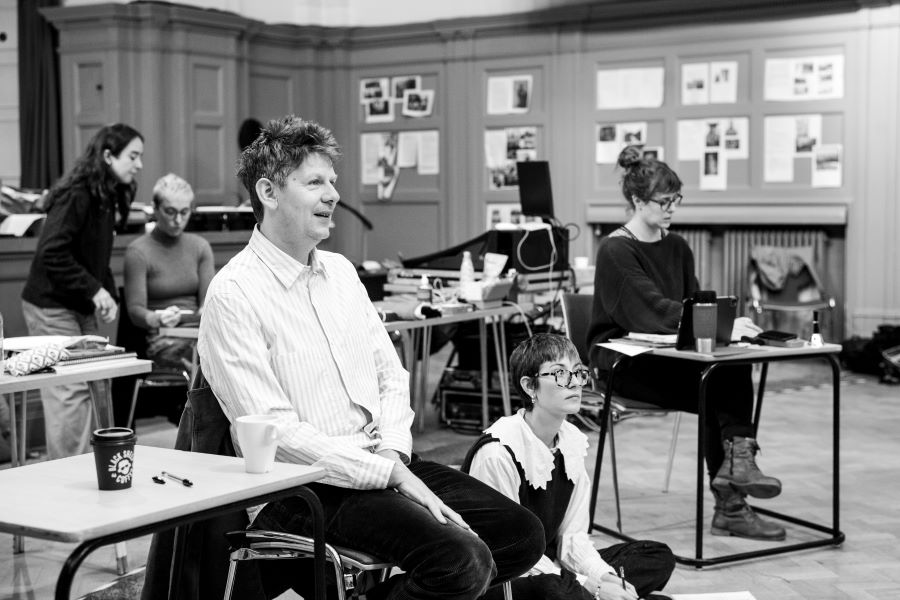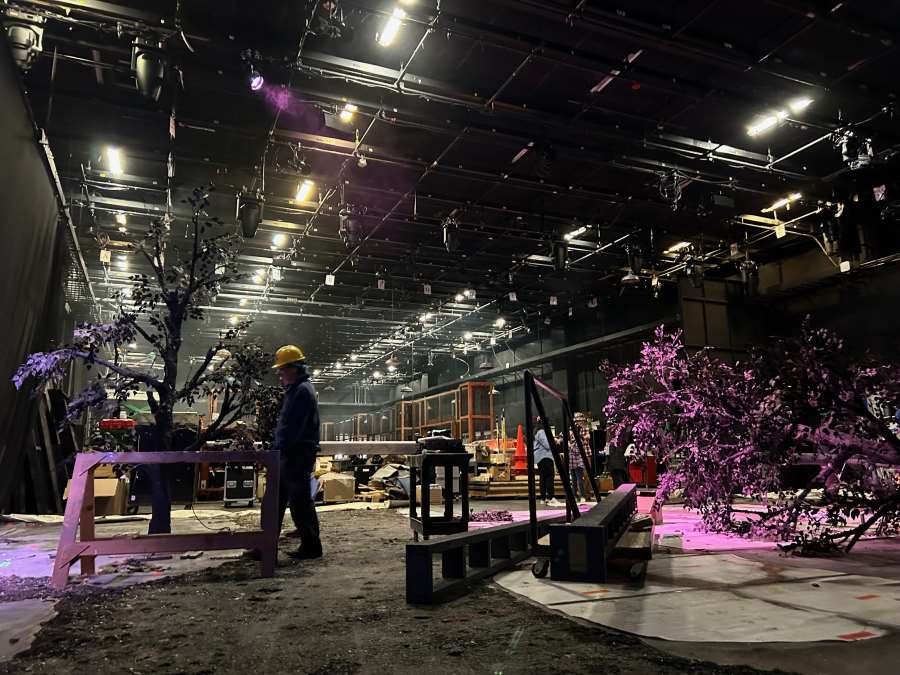In the spring, D.C. audiences met Shakespeare Theatre Company’s long-awaited Macbeth—not upon the heath, nor even downtown, at the company’s glossy Sidney Harman Hall or comparatively intimate Klein Theatre, but at the former Black Entertainment Television studios in Brentwood. There lay the promises of the season’s hottest ticket: marquee talent, industrial chic trappings, and the fruits of an international endeavor more complex than the Bard’s densest soliloquies.
The cavernous studio entrance was marked by an angular “M,” looming like a sort of contemporary family crest. The lobby inside was lined with black curtains and free-standing walls made of wood and wire that demarcated separate spaces for concessions, upscale porta-potties with running water, and a luxury donors lounge. Beyond that lay what production staff called “Area B”: an immersive walk-through rendered as a war-torn wasteland, complete with crumbling debris, scorched trees, and the hollowed-out husk of a car. Actors in military fatigues and trim suits milled about, taking stock of the carnage as we passed through. One did not dwell in Area B: It was a liminal space, there to set the tone for a modern-dress Scotland that could have easily stood in for modern-day Ukraine.
On we went to the stage house, where three low racks of seating ringed a raised thrust stage, evoking a boxing arena. Designer Frankie Bradshaw’s high modern set, rendered in former Eastern Bloc gray, sported a tiled playing area backed by a wide staircase, two pairs of entrances on the lower and upper levels, and translucent sliding doors prominently placed in the upper center. Flanking the stage were massive bronze walls that closed behind the audience, forming a backstage passage. Apart from occasional entrances and exits through the vomitoria, our brief immersive plunge was over: All eyes belonged on the stage.
For there, strutting and fretting upon it, was the production’s main attraction: Ralph Fiennes, the Tony winner and Oscar nominee with classical credentials whose idea it was to take the production out of theatres proper and into warehouses and studios. So far this Macbeth has been to a soundstage in Liverpool, a convention center in Edinburgh, and a dockside event space in London prior to leaping the pond for its D.C. apotheosis.
That vision—nurtured by STC’s artistic director Simon Godwin and co-star Indira Varma, and executed by a transatlantic production team—is what made this opening night in April an achievement four years in the making.
Something Wicked
“There is a sense of predestination. If you are embarking on a career directing classical texts, particularly those by Shakespeare, certain plays become inevitable,” said Simon Godwin in the second-floor lobby of Sidney Harman Hall back in January.
By then, his Macbeth—a play that could hardly be better suited to talk of predestination—was already up and running in the U.K. and slated to arrive in D.C. for a four-week run starting April 9. Snagging it was “a coup for a city that loves its classics,” Washington Post critic emeritus Peter Marks would later proclaim. No surprise, then, that it was already well on its way to becoming Shakespeare Theatre Company’s best-selling show ever.
It might seem appropriate that Macbeth should capture the attention of the most status-obsessed town in America, though Godwin said the story cuts to a deeper existential issue.
“He’s a man that hasn’t achieved his full potential,” he said, noting Lady Macbeth’s criticism that he is “too full o’ the milk of human kindness.” “So when this provocative comment arrives about how maybe his potential is to become the king, he decides to use that as a spur.”

The provocation comes from the play’s three witches, who predict Macbeth’s rise from loyal general to king of Scotland. What follows in Shakespeare’s leanest tragedy (here made leaner by Emily Burns’s adaptation) has been played with aplomb by everyone from Orson Welles to Ian McKellen to Denzel Washington. Godwin’s first challenge, then, was to walk this well-worn path his own way.
“The more the play is done, the more pressure grows on one to justify doing the play,” he admitted. His guiding light, appropriately enough, was Fiennes, whom Godwin previously directed in Shaw’s Man and Superman and Shakespeare’s Antony and Cleopatra. It was Fiennes’s desire to “get out of theatres, to create a less cozy, more adventurous take on that text” that prompted them to swap the theatre district for the warehouse district.
As noted, the production’s setting was unmistakably contemporary. The Weird Sisters, for one, were costumed by Bradshaw as dust-caked denizens of global conflict, and, according to Godwin, the invasion of Ukraine by Putin’s Russia was particularly on the team’s mind. “We’re not being coy about the fact that if you tell a story of a strongman who is waging a war against his neighbor, there is going to be a provocation,” said Godwin. “That’s a healthy provocation, because we do want the play to look and feel like it’s about today.”
Fiennes’s Macbeth certainly looked like he could have walked straight out of a CNN feed. He went from workmanlike warrior in military fatigues to a man guilty to the point of illness, then to a cocksure, surprisingly comic monarch, and finally a madman drunk on his own delusions of invincibility. His rangy performance, anchored by total ease with the text, left open questions of who his Macbeth really was: a decent man whose descent into murder untethered him from reality, or an obnoxious, insecure asshole who just needed a crown to show his true colors?
While obviously the lead in more ways than one, Fiennes was very much part of the production’s gestalt. “I’ve worked with stars in the past where it’s felt a little bit like a star turn,” said Ben Turner, a British actor who played Macbeth’s chief rival, Macduff. “It certainly never felt like that with Ralph.” That’s a credit not only to Fiennes’s professionalism but also to Godwin’s effort to create a “sense of democracy and collusion.” In his scheme, the actors took turns reading each other’s parts, and were each asked to prepare detailed backstories to flesh out their characters. Turner, for his part, gave Macduff a first name, “Gaven,” an old Scottish word meaning “white hawk”—a reference to the real-life white hawk Turner’s grandfather used to own.
As this living loophole, the man who was famously “from his mother’s womb / Untimely ripped,” Turner made a compelling counterpoint to Fiennes’s Macbeth. If Macbeth is helpless in the grip of his own mind, Macduff embraces his human frailties, never more so than in what Turner called “the unplayable scene”: Act 4, Scene 3, in which Ross (Ben Allen) delivers the news to Macduff that his family has been brutally murdered in his absence.
Turner credited Godwin for helping him master this emotionally draining exchange. “In the last week of rehearsal, he came over to me and said, ‘I just think the play wants this man to break,’” Turner recalled. Up to that point, Turner had resisted letting the anguish consume him. “He said to me, ‘Trust me, man, just let yourself go and do it.’ I did, I went there, and I’d like to think the unplayable scene is playable now.”
The work came through onstage. “Dispute it like a man,” Malcolm (Ewan Black) charges Macduff. “I shall do so,” Turner’s Macduff croaked through tears, “but I must also feel it as a man.” While Turner maintained fidelity to the truth of his own character above all else, I couldn’t help but see the difference between his dignified, vulnerable Macduff and the manic Macbeth as a clarification of the play as a whole—a graphic demonstration of two soldiers walking very different paths through manhood.
Turner was last seen in D.C. in STC’s co-production of The Jungle, a more truly immersive show than Macbeth, playing an Afghan chef lording over a migrant camp restaurant. For Turner, there is no comparison between the level of participation in the two projects—if anything, he said, the Scottish Play got even less immersive when it jumped the pond. “We used to have a lot more interaction with the audience in the U.K., just in terms of showing them to their seats and moving them along, Turner recalled.
There was no such interaction in D.C., partly because the studios formed a smaller space than in any of the U.K. runs, meaning less room to navigate. Additionally, the audience was, by Turner’s estimation, older and geared more toward subscribers, a group STC may have been inclined to protect from rough exchanges with soldiers, even pretend ones. “Audiences here have paid a lot of money for their tickets,” he observed. “We were told to sort of rein it back a bit.”
On the other hand, Turner noted with appreciation that Americans tend to show greater affection than their stiff-upper-lip British counterparts. They also laughed quite a bit more. “Macbeth became a comedy,” he said of the invited dress rehearsal. “After 120 shows, it certainly threw us a little bit.” In the end, the effusive D.C. welcome was just reward for a grueling process.

Toil and Trouble
The long road to D.C. began in April 2020, when Fiennes and Godwin gathered a reading of Macbeth in the proverbial Zoom room. On the roster was Indira Varma, someone with whom Godwin and Fiennes had worked happily in Man and Superman. Varma stayed with the project through a series of virtual and in-person readings and was integral to the creative process. It’s no wonder Fiennes and Godwin wanted her: from swelling with pride as her husband’s star rises to deflating under the weight of her own madness, Varma made an utterly transfixing Lady M.
After the director and leading duo came more collaborators—not to mention big-ticket funders, the kind who can make possible a star-studded multi-city show with high production values. The biggest were U.K.-based commercial producers Wessex Grove and Underbelly. STC entered the partnership as a producer, contributing to the capitalization and weighing in on budgeting under Godwin’s leadership. At the end of the day, however, the company, which stayed together for the duration of the tour (except for the child actors, who were recast at each port of call), was on the commercial payroll. When the show arrived in D.C., STC paid their partners weekly fees while devoting staff time and capital to the run.
It was a complex financial arrangement, certainly, but it could hardly have been more complex than the challenge of outfitting an unconventional space for live theatre and bringing a show over from the U.K. at the same time. Enter Joseph Smelser, STC’s senior director of production, whose biggest task was making the old BET studios fit the purpose and putting all the pieces in their proper place.
One of the production team’s biggest obstacles was public permitting, which fell to production manager Janice Jenson to navigate. Seven permits were filed with the District of Columbia, one of which wasn’t issued until the day before previews. Many had to do with safety, a concern which threatened to limit the show’s seating capacity. “If we’re two inches off and that chair doesn’t fit at the end of that row, you can’t make up space—you just get rid of the chair,” Smelser told me in February. “You can’t go into the fire aisle, because when the fire marshal comes through and measures it, they’ll make you take it away.”
As general manager Max Schwager later attested, capacity was a concern from the beginning. “I think in terms of location, it’s fantastic and it hit all the marks we were looking for,” he said of the locale. “In terms of size, I think there was hope to find a space that would facilitate a little bit more in terms of seating.” The count eventually came in at 650 (a few hundred less than in the U.K. houses), though the exact number was still up in the air when the first batch of tickets went on sale.
Apart from the seating issues, the team also had to be sure the space could perform basic functions. “You get a lot of blood in Macbeth, right?” said Smelser—an understatement, considering that it literally poured from the walls at one point in this production. “So we need two washers and dryers and two soaking sinks to get through all that between a matinee and an evening, and there’s no dryer hookup or washer hookup in the building.” The very first day in the space, then, involved connecting the internet, setting up ice machines, and bringing in washers and dryers.
In all, this Macbeth required seven production managers: Smelser himself, three he works with regularly at STC, one from the U.K. to help with installation, and two to develop the lobby. Together they supervised a series of contractors brought in to do everything from build seating risers to sort out the lobby. Add in the fact that this seven-person team was spread across D.C., New York, Oregon, and London, and you had, as Smelser said, a lot of brilliant minds to work with and a lot of computer software setups to sort out.
All of this was groundwork for actually bringing in the show, which happened in multiple phases. Costumes and hand props were overnighted directly from London in time for two days of tech with the actors; initially the company planned to return them to the U.K. so as not to pay import taxes, but eventually landed on keeping them in D.C. The immersive components of the set, meanwhile, were recreated under the direction of the designer and shipped from the U.K. in advance. The stage itself was recreated stateside based on drawings and specifi cations.
Many crew members from the U.K. runs were also brought over, some to supervise load-in and some to run the show. Schwager and his team oversaw the visa process, while STC’s company management dealt with housing, as well as feeding a crew in a virtual food desert (a rare challenge, considering the wealth of options in Gallery Place, where their home theatres reside).
Another challenge was a matter of public relations. The show had no problem selling out. But as Neal Racioppo, STC’s senior director of marketing and communications, admitted to me, the perception that this Macbeth was too rich for some blood was hard to shake. Some tickets sold for $500, even if, as Racioppo notes, that broke down to $250 per ticket plus $250 of premium add-ons (parking, access to the lounge, merchandise, etc.). Regular tickets, he pointed out, were priced at five different levels ranging from $35 to $345, though by the time many users joined the queue, all that was left were the premium packages.
Those prices were a bargain compared to the $2,000 some third-party resale sites were selling seats for. And STC staff are quick to point out that they conducted robust outreach through their educational wing and offered $20 lottery tickets to each performance in partnership with TodayTix.

Tomorrow and Tomorrow
When the hurly-burly was done, the production’s merits came through to most critics. Rhoda Feng, writing in the Washington Post, praised Godwin’s “finesse,” the “gripping naturalism” of Fiennes’s delivery, an overall conceit that looked “devastatingly of our time,” and a rare sense of humor. “There is unusual star power here, to be sure,” wrote DC Theater Arts’ Deryl Davis, “but STC artistic director Simon Godwin and a remarkable cast breathe new, humanizing life into this familiar tale about the dehumanizing effects of repeated violence.”
If there was a hint of disappointment, it came through in Chris Klimek’s review for Washington City Paper. “This Macbeth,” Klimek wrote, “may be less radical than we were promised, but it’s as bloody, bold, and resolute as you’d hope.” Klimek’s main beef: that the purported “immersive” components didn’t amount to much, and that what was accomplished on the warehouse might just as easily have been done back at Harman Hall.
Indeed, I did hear some staff express the sentiment that they would think twice about such an ambitious project in the future. Still, by most measures, STC pulled off this remote gamble, and did so from a position of strength. Macbeth wasn’t just their all-time best-seller; it’s one of five of theatre’s top 10 sellers, which have all come since post-lockdown reopening: the Britney Spears jukebox musical Once Upon a One More Time, which went on to Broadway; Patrick Page’s leading turn in King Lear; Evita, co-produced with the American Repertory Theater; and Bard on the Beach’s Beatles-infused As You Like It. Those last two took their bows just this season.
Even in that heady company, Macbeth was, in Racioppo’s words, “a game changer.” Getting a handle on exactly what changing the game cost has been difficult, and not just for a snoop like me. The show was obviously expensive, and the downgrade in seating capacity compared to the U.K. runs was problematic for the bottom line—though the company did receive “a significant gift to support the extraordinary production costs associated with producing” the show from underwriter Jacqueline Badger Mars.
Whatever the price tag, everyone points to the show’s long-term benefits. “We may end up actually losing money when you look at it in terms of ticket sales,” Smelser conceded. “But it’s an investment in a much bigger experience for Shakespeare Theatre Company and for Simon’s vision.” The company has already seen robust season ticket subscriptions for next season, for instance, and they’ll use some material investments for this production—new chairs, internet ports—to replenish their stock.
For his part, Godwin sees Macbeth as adding to the company’s legacy of creating world-class Shakespeare productions in the nation’s capital.
“I think if the production attracts other exciting world-class artists to come to the city and make world-class work, then that will be Macbeth really doing its job,” he said in January. It may have already done the trick: Matthew Broderick, set to star in a new adaptation of Sinclair Lewis’s novel Babbitt, is headlining a 2024-25 season that also includes Hugh Bonneville, John Kani, and the return of Patrick Page.
In many ways, this ambitious Macbeth adventure seemed the logical next step for a company of certain means that wanted to meet a perceived hunger for post-Covid-lockdown live art. Racioppo points to recent area hits like Arena Stage’s Swept Away or Signature Theatre’s Ragtime as further evidence of that desire. “I don’t want to speak for other theatres, but I think all of that happening at the same time is not a coincidence,” he said. “People are hungry for the arts, and they’re feeling good about being out again, and they’re willing to pay what they’re willing to pay because they value it so much.”
If this season and next are anything to go by, we can expect STC and other big theatres to maintain a hunger for big projects, and in some cases, to keep pinning their hopes on the Bard: The Guthrie recently staged a Henriad trilogy in rep for the first time since 1990, and the Old Globe is in the midst of an epic two-part journey through Shakespeare’s Henry VI plays. What value these big swings yield in the long run remains to be seen. But on the back of a record-breaking season, Shakespeare Theatre Company shows no signs of tempering its vaulting ambitions.
Jared Strange (he/him) is the director of education and community programs at the National Theatre Foundation, as well as a writer, dramaturg, scholar, and educator based in the Washington, D.C., area.


